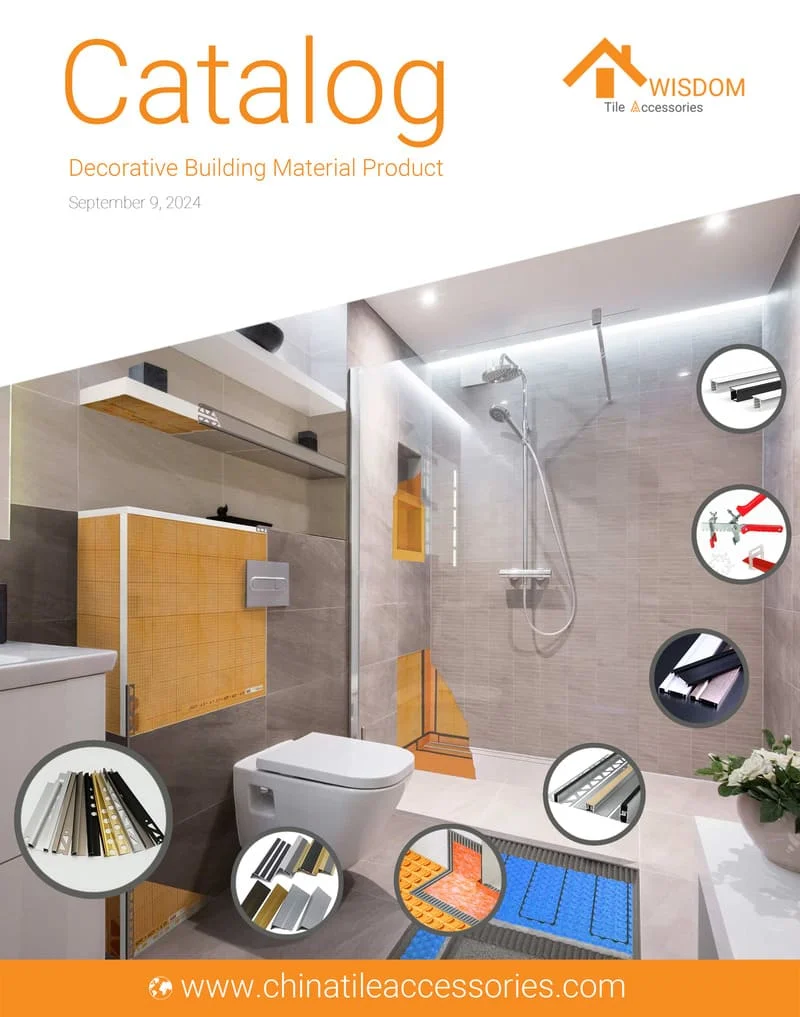In this article we look at the best drill bits for tiles to get top results. When making holes in tiles it's key to use a drill bit made for the material you're working with. The type of tile you have will therefore decide the best drill bits for tiles to use.
Best drill bit for ceramic tiles
1. Diamond-tipped drill bits
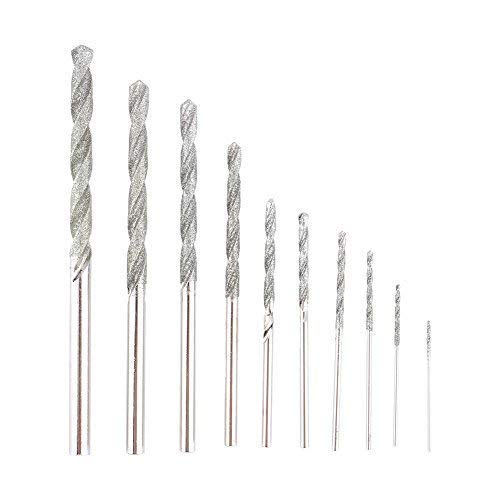
Diamond-tipped drill bits offer high performance and precision when drilling ceramic tiles. These bits effectively reduce the risk of chipping or cracking during the drilling process. Diamond-tipped drill bits are suitable for both professional tiling projects and DIY applications.
2. Carbide-tipped masonry drill bits

Carbide-tipped masonry drill bits present a cost-effective option for drilling ceramic tiles. These bits exhibit sufficient durability for most ceramic tile drilling tasks. Carbide-tipped masonry drill bits are readily available in hardware stores and home improvement centers.
3. Tile and glass drill bits
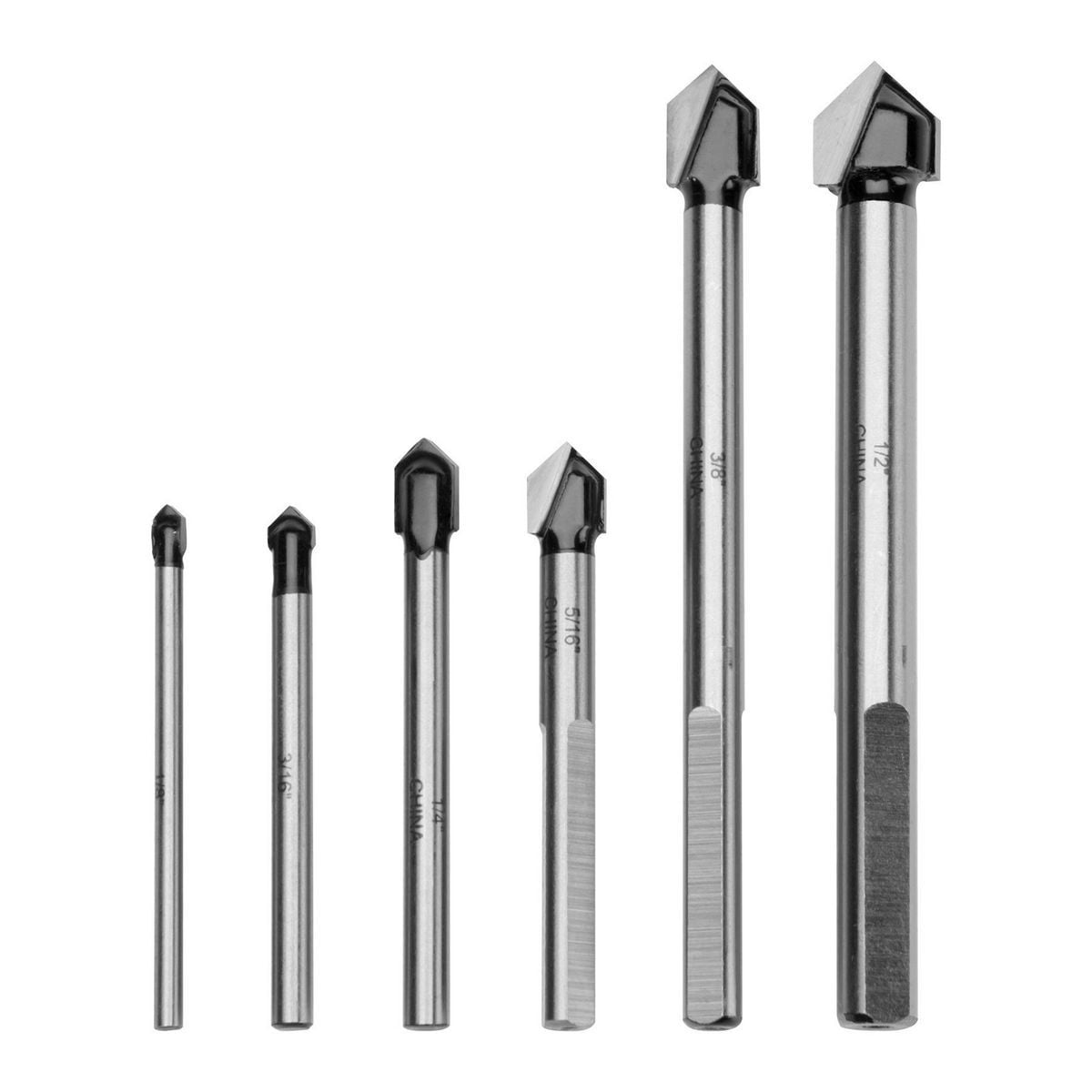
Tile and glass drill bits are specifically engineered for use on ceramic tiles. Many of these bits feature a spear-point tip design. This design helps prevent the bit from slipping on the tile surface and minimizes the risk of cracking during drilling.
When selecting a drill bit for ceramic tiles, consider factors such as the specific tile material, project requirements, and budget constraints. For drilling porcelain tiles, which are typically denser than ceramic tiles, diamond-tipped drill bits often provide optimal results.
To drill through ceramic tile without cracking, it is advisable to use water as a lubricant and coolant during the drilling process. This technique helps extend the life of the drill bit and can improve cutting performance. Additionally, starting at a slow speed and gradually increasing as the hole is established can contribute to achieving better results when drilling tile.
Drill Bit Type | Key Feature | Best For |
|---|---|---|
Diamond-tipped | Precision | All projects |
Carbide-tipped | Affordable | Occasional use |
Tile and glass | Slip-resistant | Specific tasks |
Best bits for drilling porcelain tile
1. Diamond-tipped drill bits
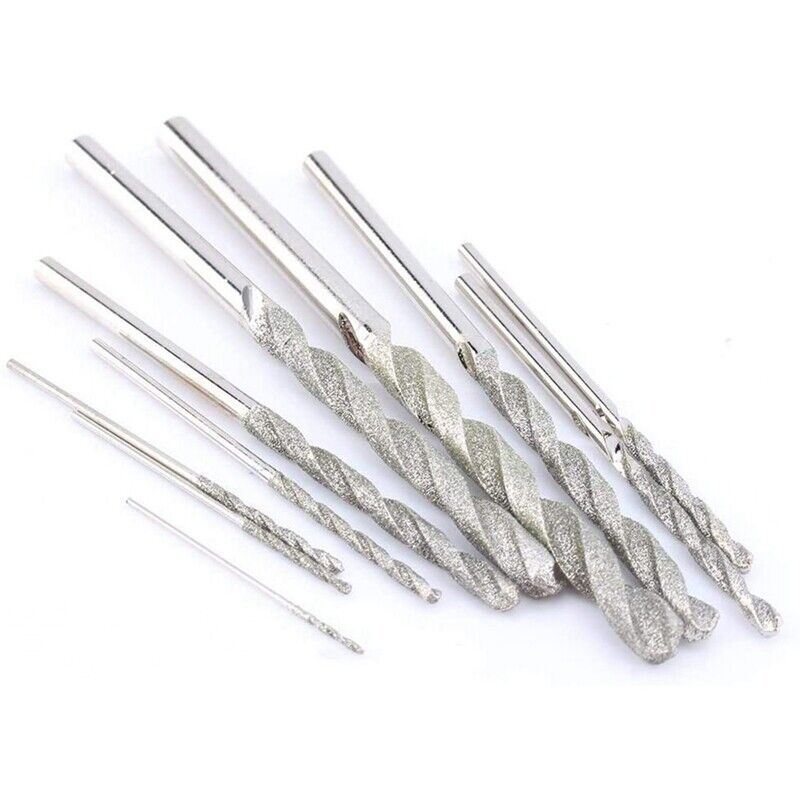
Diamond-tipped drill bits effectively penetrate hard porcelain tiles. The diamond coating maintains sharpness for extended periods, allowing for multiple uses on dense porcelain surfaces. These bits create clean, precise holes in porcelain without causing cracks or chips.
2. Diamond core drill bits
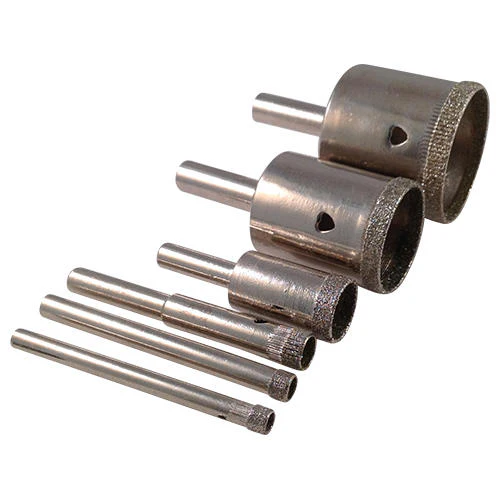
Diamond core drill bits excel at creating larger holes in porcelain tiles. They utilize vacuum brazed diamond technology, which enhances their cutting ability. Many diamond core bits feature depth markers, enabling precise depth control during drilling.
3. Tungsten carbide-tipped drill bits
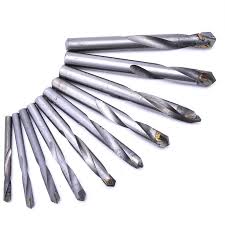
Tungsten carbide-tipped drill bits offer an alternative for drilling porcelain tiles when diamond bits are not available. While they can drill through porcelain, they may wear out more quickly compared to diamond-tipped options. Carbide-tipped bits are often more affordable and widely available.
When drilling porcelain tiles, it is advisable to use water as a lubricant and coolant. This practice helps extend the life of the drill bit and improves cutting performance. Additionally, starting at a slow speed and gradually increasing as the hole is established contributes to achieving better results when drilling porcelain tile.
For optimal results, hold the drill firmly and apply slow, steady pressure when drilling through porcelain tile. If drilling through to masonry or concrete behind the tile, avoid using the drill's hammer action until the bit has penetrated through the tile surface.
Drill Bit Type | Key Feature | Best For |
|---|---|---|
Diamond-tipped | Long-lasting | Hard surfaces |
Diamond core | Depth control | Large holes |
Tungsten carbide | Cost-effective | Limited use |
Tips for drilling both types of tiles
- Use water or a cooling agent to prevent overheating when drilling through tile. This practice extends the life of the drill bit and improves cutting performance.
- Start at low speed to establish a groove on the tile surface. This technique helps prevent the drill bit from slipping and reduces the risk of cracking.
- Apply steady, gentle pressure when drilling porcelain or ceramic tiles. Excessive force may cause the tile to crack or chip.
- Consider using diamond hole saws for larger holes in both ceramic and porcelain tiles. These tools provide precise cuts for larger openings.
Things to know when choosing drill bits
- Material hardness: Porcelain tiles are typically denser and harder than ceramic tiles, requiring more durable drill bits.
- Hole size required: Different drill bit types and sizes are suitable for various hole diameters. Diamond core drill bits excel at creating larger holes in porcelain tiles.
- Frequency of use: For frequent tile drilling, investing in high-quality diamond-tipped drill bits may be more cost-effective in the long run.
- Budget considerations: While diamond-tipped drill bits offer superior performance, carbide-tipped options provide a more affordable alternative for occasional use.
When selecting a drill bit for tile, consider the specific tile material and project requirements. For drilling porcelain tile without cracking, diamond-tipped drill bits often yield the best results. To drill a hole in ceramic tile, mark the desired location, use a center punch to create a small indentation, and then proceed with the appropriate drill bit using steady pressure and moderate speed.
If you want to learn how to drill through porcelain tile, it is advisable to use a diamond-tipped drill bit and apply water as a lubricant during the process. This method helps achieve clean, precise holes in porcelain surfaces.
Proper technique for drilling tiles
- Marking the drilling spot: Use a pencil or marker to precisely indicate the location for drilling. For increased accuracy, employ a center punch to create a small indentation.
- Using masking tape to prevent slipping: Apply a piece of masking tape over the marked area. This technique helps prevent the drill bit from wandering when starting the hole.
- Proper drill speed and pressure: Begin drilling at a low speed to establish a groove on the tile surface. Gradually increase the speed while maintaining steady, gentle pressure. This method reduces the risk of cracking or chipping the tile.
- Cooling methods during drilling: Apply water or a specialized cooling agent to the drilling area. This practice prevents overheating of the drill bit and tile, extending the life of the bit and improving cutting performance.
Maintenance and care of tile drill bits
- Cleaning after use: After drilling porcelain or ceramic tiles, clean the drill bits thoroughly to remove debris and dust. Use a brush or compressed air to clear the cutting edges and flutes.
- Proper storage: Store tile drill bits in a dry environment to prevent rust and corrosion. Consider using a drill bit organizer or case to protect the cutting edges from damage.
- When to replace worn bits: Inspect drill bits regularly for signs of wear, such as dulled cutting edges or chipped diamond coating. Replace drill bits when they no longer cut efficiently or when holes become ragged or oversized.
To drill through porcelain tile without cracking, use a diamond-tipped drill bit and apply water as a lubricant during the process. When drilling holes in ceramic tile, start with a small pilot hole and gradually increase the size if necessary.
When selecting the best drill bit for tile floors, consider the specific tile material and project requirements. Diamond-tipped bits often provide optimal results for both ceramic and porcelain tiles, while carbide-tipped options offer a more affordable alternative for occasional use.
Frequently Asked Questions
What's the difference between drill bits for ceramic and porcelain tiles?
Ceramic tiles can typically be drilled with carbide-tipped masonry bits, while porcelain tiles require diamond-tipped bits due to their harder surface. Diamond-tipped bits can be used on both types but are more expensive.
How do I prevent my tile from cracking when drilling?
To prevent cracking:
- Use masking tape over the drilling spot
- Start at a low speed
- Apply steady, gentle pressure
- Use water as a coolant for the drill bit
- Avoid drilling near the edges of tiles
Can I use a regular drill bit for tiles?
Regular drill bits are not suitable for tiles. They can cause chipping, cracking, or shattering. Always use specialized bits designed for tile, such as diamond-tipped or carbide-tipped bits.
How long do diamond drill bits last when drilling tiles?
The lifespan of a diamond drill bit depends on factors like bit quality, tile hardness, and usage frequency. With proper care, a high-quality diamond bit can last for 50-100 holes in hard porcelain tile.
What's the best way to drill large holes in tile?
For large holes:
- Use a diamond hole saw for the most precise cuts
- Start with a smaller pilot hole
- Use plenty of water for cooling
- Apply steady, gentle pressure
- Go slowly to avoid overheating


